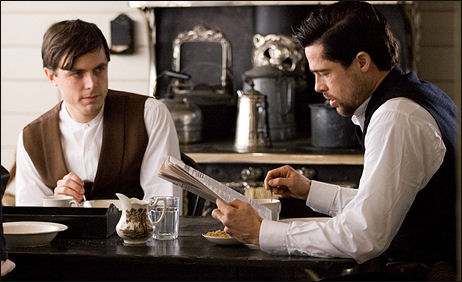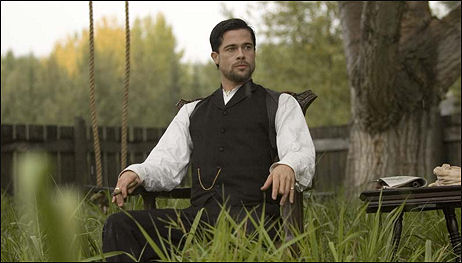I was told that earlier this week that the review date for Andrew Dominik‘s The Assassination of Jesse James by the Coward Robert Ford (Warner Bros., 9.21) would be Tuesday, 9.4 — a curious guideline that didn’t take into account the imminent unveiling at the Venice Film Festival. The bottom line is that Variety‘s Todd McCarthy and the Hollywood Reporter‘s Kirk Honeycutt went with reviews earlier today — a euphoric rave and a sneering pan, respectively.

I’m too travel-whipped to tap out an opinion — it’s 11:05 pm and I’m fading fast — but McCarthy’s take is the one to consider and trust. Don’t even read the Honeycutt — it’s not even there.
This is a major “art western” of the first order — one of the most immaculate and uncannily “right” time-machine visits into a bygone world ever put to the screen. As far from a post-modern shoot-em-up as you can get and not even a contender in the ways of the rousing, rip-snortin’ Wild Bunch, this is one of those awesomely assembled visitations that just sinks in like a sunovabitch. It makes you sit right up and forget everything except for the novelistic richness and aliveness of what’s filling the screen. Either a movie like this is “in the zone” or it isn’t, and Jesse James‘ worth is unquestionable in this respect. Any film maven who doesn’t recognize this simple fact has, no offense, his head up his ass.
I’ll grant that the story meanders in the middle (only nitpicky soreheads will make a big thing out of this…an urge that never once crossed my mind) and that Dominik’s theme about twisted hero worship and the hunger for celebrity is not the most rousing I’ve considered or absorbed (although it’s servicable enough), but the bottom line is that this is a movie about cinematic painterliness of a stunningly fine pedigree, and sometimes this is entirely enough in itself. And to this end kudos are due to not only Dominik but cinematographer Roger Deakins.

As McCarthy allows, “Even those who resist the film itself will be in awe of its surpassing visual beauty and consummate craftsmanship. Just when it seemed that…Deakins had achieved another career high with No Country for Old Men, he trumps himself yet again, here using a subdued palette of parched-plains earth tones captured with an extraordinary luminosity and delicacy.”
As I watched Jesse James the closest atmospheric analogies among westerns I could think of were Terrence Malick‘s Days of Heaven and Philip Borsos‘ The Grey Fox. McCarthy also brings up McCabe & Mrs. Miller, Pat Garrett & Billy the Kid, Bad Company, The Great Northfield Minnesota Raid, Jeremiah Johnson, The Outlaw Josey Wales, The Long Riders and Heaven’s Gate.
The Assassination of Jesse James by the Coward Robert Ford is “a ravishing, magisterial, poetic epic that moves its characters toward their tragic destinies with all the implacability of a Greek drama,” he begins, and is thereby “one of the best Westerns of the 1970s, which represents the highest possible praise. It’s a magnificent throwback to a time when filmmakers found all sorts of ways to refashion Hollywood’s oldest and most durable genre.”


